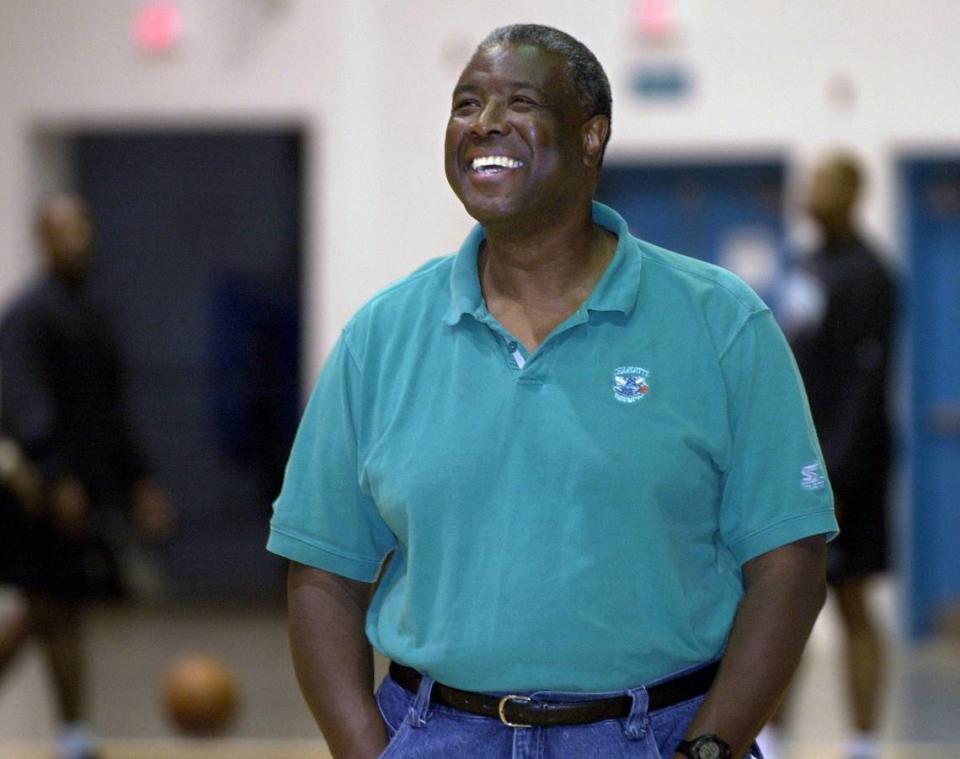Memorial service for Paul Silas, former Charlotte Hornets coach, highlights his impact
They held a moving memorial service for Paul Silas on Saturday in Charlotte, one that felt a bit like an NBA reunion.
Among the 200 or so mourners at the private event at The Park Church were coaches, players, friends and colleagues of Silas, who played 16 years in the NBA and later coached the Charlotte Hornets on two different occasions.
Baron Davis and Stephen Jackson, two of Silas’ former players for the Hornets, both spoke. So did Indiana Pacers head coach Rick Carlisle and Charlotte Hornets president Fred Whitfield.
Sprinkled in the audience were basketball hall of famer David Thompson, Hornets coach Steve Clifford, Charlotte general manager Mitch Kupchak and George Shinn, the original Hornets owner.
Silas died on Dec. 10, 2022, at age 79, at his home in Denver, N.C. The celebration of his life was held seven weeks later to avoid the holidays and allow time for people to arrange their travel plans to get to Charlotte and fondly remember the man several of them referred to as “a gentle giant.”
Davis said when the Hornets drafted him No. 3 overall in 1999 that he was a “misunderstood kid from South Central L.A. ... And he got to the root of who I was, and who I wanted to be. For me, that was the first time I saw a father figure.”
On a Hornets road trip to Los Angeles, Davis recalled how Silas decided it was important for the other players to understand the difficult circumstances in which Davis had grown up.
“We pulled up with two team buses,” Davis said. “Everybody on the team got out. And I think the whole team realized like, ‘Hey, he (Davis) is a good kid, but he really is from the hood. ...’ It was crazy. People started pulling up from everywhere. But it just showed to me that he (Silas) cared about me, and he cared about what I cared about.”

Jackson said he had long wanted to play for Silas — who was also the first NBA head coach LeBron James had when James was a rookie in Cleveland — before Jackson finally got the chance in Charlotte.
“And once I finally got a chance to play for him, it meant the world,” Jackson said. “I had seen how he adopted so many other players on teams that he’s coached. I was anxious to be the next one to be adopted. ... And he didn’t let me down at all. It exceeded everything I expected.”
In his remarks, Carlisle read messages from several NBA greats he had personally collected about Silas, including Kareem Abdul-Jabbar and Charles Barkley. Abdul-Jabbar had been a rival of Silas in the NBA, but later became his friend.
“I got to know Paul in retirement,” Abdul-Jabbar said in the message read by Carlisle. “We went on a trip with the (NBA) Players Association to China. I was happy to find him as warm and personable off the court as he was punishing on the court.”

Carlisle laughingly recalled that Abdul-Jabbar had been his favorite player in eighth grade and he had been dismayed at that age to see Silas making life so difficult for the NBA’s eventual all-time leading scorer in the early 1970s.
Said Carlisle: “I’m watching these games and wondering, ‘Who is this guy with his frumpy body that runs crooked, that has a crooked-looking jump shot that can only jump two inches off the floor but is making life miserable for my favorite player?’ ”
Among Silas’ survivors are his wife, Carolyn, his daughter Paula Silas-Guy and his son Stephen Silas, now the head coach of the Houston Rockets. Silas-Guy told the New York Times in December that the cause of her father’s death was cardiac arrest.
Boston Globe sportswriter Bob Ryan also spoke at the memorial service and wrote a remembrance for the program. He had become friends with Silas during Silas’ four years playing for the Boston Celtics, during which the team won NBA championships in 1974 and 1976.
The 6-foot-7 Silas was a bruising rebounder for Celtics teams that included future hall of famers John Havlicek, Dave Cowens, Jo Jo White and Paul Westphal. But, Ryan wrote: “The true conscience of the team was Paul Silas.”

 Yahoo Movies
Yahoo Movies 
